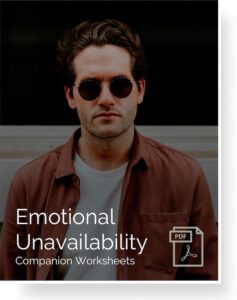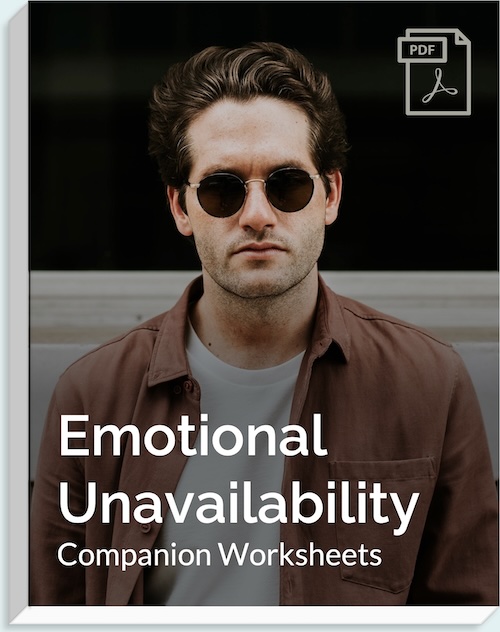How to tell if someone is emotionally unavailable.
Emotional unavailability isn’t always cold or avoidant. Sometimes it looks like charm. Control. Or being so independent that no one ever really gets in.
This is Part 2 of a 3-part series on emotionally unavailable relationships — and in this post, we’re looking at how to spot the pattern when it’s not obvious. If you missed Part 1, start there.
- What does it mean to be emotionally unavailable? (Part 1)
- How to tell if someone is emotionally unavailable. (Part 2)
- How to deal stop dating emotionally unavailable men. (Part 3)
After working through the first post and its companion worksheet, many readers realize something surprising: They don’t just attract emotional unavailability – they carry their own version of it, too.
Not the narcissistic, shut-down, emotionally distant version. A quieter one.
One that shows up in patterns like:
- Not trusting easily
- Struggling to let people in
- Chase people who keep pulling away
If that’s you – and you’re ready to stop the heartbreak of feeling like you’re never enough – this post will help.
Because the next step is seeing how emotional unavailability hides. And once you can name the mask? You can stop falling for it.
The mask of emotional unavailability.
One of the easiest places to spot emotional unavailability is in romantic relationships. However, the impact of emotional unavailability doesn’t only apply to those relationships.
I have experienced this in friendships, family, and business relationships as well. I also hear my clients dealing with this in their marriages, with family, and at work too.
It’s everywhere.
What I’m saying is: “just because you’re not on the dating scene doesn’t mean this topic is irrelevant to you!”
You’re not off the hook yet…
How to spot emotional unavailability.
The following is a comprehensive list. As you review it for how you experience emotional unavailability from others, pay attention for any of your own behaviours.
Consider it an opportunity to see your own personal style of emotional unavailability at play.
Limiting emotional connection:
As counterintuitive as it may seem, limiting emotional connection is a common relationship issue. Overlooking it as a circumstance rather than a problematic behaviour is common too. Our culture rewards independence as a strength, and sometimes emotional connection can feel like the opposite of that; in fact, it can feel like dependence and neediness, and the desire for it can feel like weakness and vulnerability.
That’s why it can be easy to miss these types of behaviours as a problem when you first encounter them. You usually don’t see them until you’re too far into the relationship to easily make changes . In a relationship with emotional connection, it is important to deal with these issues up front.
- Keeping physical and emotional distance between themselves and others; preferring to stick with text based communication over in-person, phone, or video options.
- People who never feel “engaged” in your life, this is especially important as a flag for identifying emotionally unavailable friends.
- They’re very generous but on the flip side they have trouble receiving anything. This includes things like compliments, help, things/stuff, love, acknowledgment, and appreciation. If you’re in a relationship with someone who can’t receive, it’s likely indicative of trouble down the road.
- Avoiding/minimizing conversations about feelings and boundaries, which are necessary for functional relationships.
- They’re highly independent.
Compartmentalization of their life:
This is a flag that is easy to miss. After all it can look like someone is just being very busy, but the reality is there’s a barrier to connection whether they’re conscious of it or not.
Examples of this include:
- They keep everything separate, as in they will come to your place but don’t invite you to theirs – ever – or the other way around.
- They’re always busy with work, extracurricular activities, other people, “stuff” and you’re not invited or included. In turn this means there’s not a lot of space for you.
- They’re highly independent.
Manipulative or controlling behaviours:
This can be hard to identify when you’re in it. Over time it can feel like these behaviours are just part of the dance you do with each other and you’ve learned how to deal with or work around it.
It may surprise you to see the breadth of this type of behaviour, but once you see it you’ll recognize the painful impact it can have on the relationship and your self-esteem.
- Withholding themselves and their love, often in an effort to manipulate or change your behaviour. Meaning they might try to punish you by withholding communication to get you to stop or start doing something.
- They’re always right and see everything as black and white.
- They avoid taking responsibility by saying they don’t understand, they confuse easily, or they don’t know what to do in a given situation.
- Regular deflection, avoidance, and blame. Doesn’t matter the topic, they deflect responsibility and avoid looking at their stuff. They may even try to change the topic or put blame back onto you.
- They’re highly independent.
Avoiding commitment to both plans and people:
If you ever hear someone joking about having commitment issues, that’s an immediate red flag, at least if you’re looking for a connected relationships. It’s so easy to hide behind things like work and being busy that catching this one in the act can feel like you’re being a bit overreactive.
You’re not. If you see any of these behaviours at play, it’s worth having a bigger conversation about what’s going on. The way they respond to your inquiry will tell you a lot about their level of emotional availability.
- Inability to commit to plans; the person who likes to get a ‘loose idea’ of what you’re up to this coming weekend but avoids setting any firm plans
- Always looking for bigger and better; constantly texting with other people and checking social media or email when they’re with you
- Often labeled as players – both the men and women
- They cheat on their partners or participate in extra-marital affairs by being the ‘other man/woman’
- You’ve heard them say ‘I have commitment issues as a joke – sarcastic jokes like this are based in truth… and that’s what you want to pay attention to
- They’re highly independent
Avoiding responsibility for impact:
Have you ever had a relationship with someone (maybe you’re in one right now?) where you feel like you can never really pin them down? Like you’re not getting a straight answer about things or if you try to talk to them about something you leave the conversation feeling more confused than before you started?
That’s a version of emotional unavailability at play, and it’s really hard. It’s hard on people, on relationships, on self-esteem… If you’re familiar with any of these, you’re likely dealing with emotional unavailability.
- Disappearing with no explanation. This includes disappearing emotionally, even if they remain physically present.
- They make the same poor decisions over and over and over…
- Dating the same type of person – or worse yet, the same person! – even when they know it’ll end in disaster
- Always ‘saving’ the same (type of) person from the same problems
- Taking the same type of job even though they hate it
- They’re elusive and regularly have to explain and re-explain things
- They won’t ask for what they need outright
- They’re highly independent.
These lists will give you some markers to start working with. As you reviewed these lists of examples, did you see any of the behaviours or tendencies in yourself?
Using these examples can be a great way to help you identify the ways you may be hiding your emotional unavailability, and give you a place to start from. As stated earlier, once you can see the problem it’s way easier to do something about it. When it lives in your blind spot you will always be victim to it.

Emotional unavailability and being “highly independent”:
You may have noticed as you were reading the above sections that “highly independent” appeared on every list.
That wasn’t an accident.
Being highly independent is a coping mechanism lots of people have developed. It allows them to have relationships but not connect with them on a deep emotional level.
It’s like having one foot out the door all the time, ready to run or hide if there are signs of emotional ‘danger’. You’ll never be let down by another if you never rely on anyone for anything. You’ll never be hurt by another if you don’t expose your deepest truths to them.
Being highly independent creates the illusion of being connected to other people. It can seem like you’re even open and available for deep intimacy with another, but because you never really trust anyone to be there for you, you’re not really “in it” anyway.
(Notice I said “you” in that last paragraph? That wasn’t by accident either…)
Emotional unavailability and the use of digital devices:
Emotional unavailability is an issue that has long plagued our culture. However, as technology continues to change how we connect and communicate, emotional unavailability has become an epidemic.
In today’s world we get to hide our emotional unavailability behind computer screens and smartphones.
As we continue to rely on digital communication instead of face-to-face interaction, this epidemic will continue to worsen. It is up to you to identify and fix it within yourself. Only you can be a stand for having emotionally available, functional connections in your life.
Standing in your power stops you from getting stuck with people that will hurt you.
Emotional unavailability and fixing or ‘saving’ others:
One of the most frequent ways I see this pattern manifest is, people getting into a relationship with someone who is emotionally unavailable and thinking they can fix or change them.
Anytime fixing or changing a person comes into a relationship, it is immediately dysfunctional. This includes romantic relationships and friendships alike.
I promise you, ‘fixing’ is not an option. It’s not how it works. If you build a relationship with someone’s “potential”, you will constantly look at what they can improve (or what they’re doing wrong) and they’ll constantly feel like they’re being judged or aren’t good enough.
If you want a healthy functional relationship, emotional availability is a key ingredient from the outset.
Remember: All relationships are a mirror for us. They are an opportunity to learn about and grow ourselves. Therefore if anything you’ve read so far resonates, if relationships with emotionally unavailable people are your norm, you’ve got some work to do.
What can you do about emotional unavailability?
I’m clear that figuring out how to deal with this in your life – in whatever capacity it shows up – isn’t easy.
Seeing your own behaviour and tendencies is a real challenge for people to do on their own. With that in mind, I’d like to suggest that we start dealing with your stuff by by doing a little finger pointing first.
Start by looking outwards (at them) with this pattern. It’s often easier than looking inwards. By looking at what they do and then connecting that back to what you do, can make it easier to spot patterns.
However, this is the ONLY time I will suggest this approach. In this case, it’ll make this process easier to get your head around.
Where You Can Start?
- Start by looking at them, the other people you’re in relationships with, and see what dynamics are there. Look at your romantic relationships (past and present), your friendships, and your family. Notice what some of the similar behaviours are and make a list
- List all of the common ways you experience emotional unavailability from others. You can use the list from this post as a starting place.
- Get honest with yourself and see how you contribute to those experiences and make a list of that stuff too
- Bring your answers with you to the next post as that’s where we’ll pull this all together
What’s next?
I promise that the next post will explain how to stop this pattern from happening in your life. It’s a simple process – definitely not easy – and it works, but only if you do the work. I promise this isn’t something you can think or rationalize your way out of.
Grab a pen and (if you haven’t already) the free companion worksheets below. Then check out the next conversation armed and ready to set yourself free from this heartbreaking cycle!









